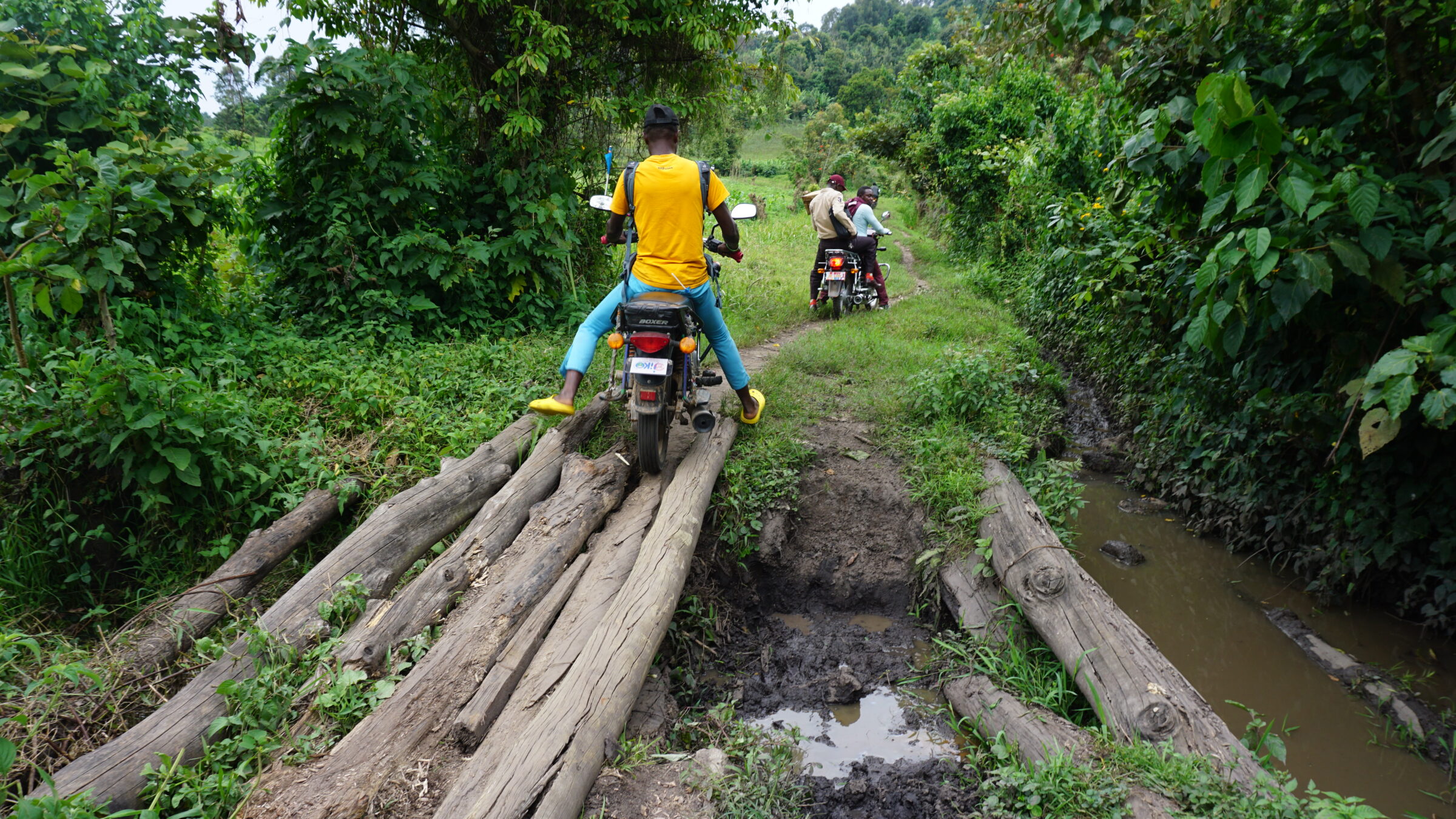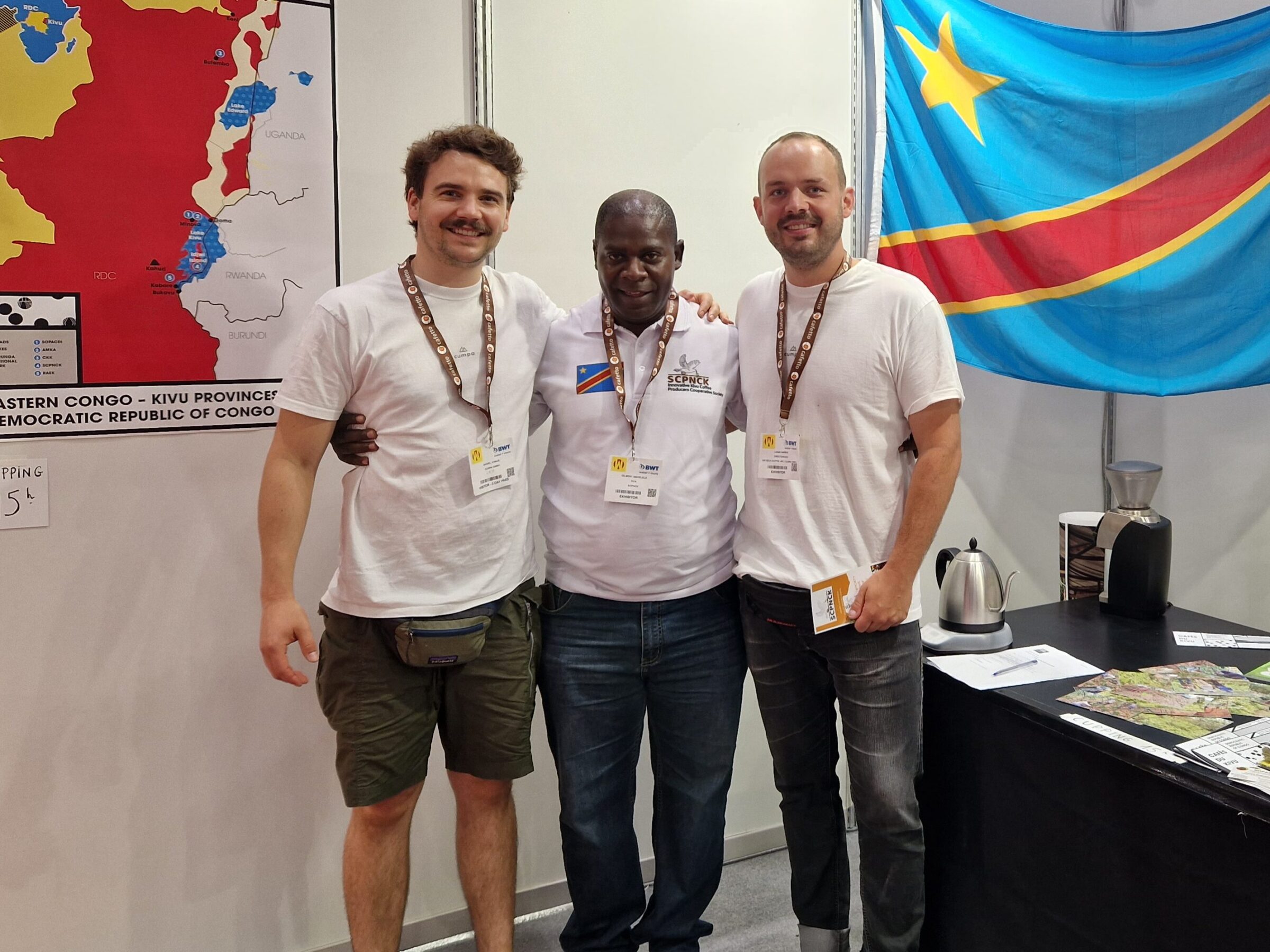DR Congo: Six years of preparation for one coffee relation

At cumpa, we’re passionate about more than just top-quality coffee beans. We’re all about connecting the people and places where coffee is grown with those who roast and enjoy it. That’s the heart of cumpa. We build our relationships naturally and personally. As we introduce you to our newest partner SCPNCK in the Democratic Republic of the Congo, we feel proud and happy, as this relationship showcases the very core of our business identity. Follow our journey, which goes back years:
In 2017, we were already working in specialty coffee, but cumpa was still a vision that had to be realized. Lukas and Daniel were studying in Karlsruhe and trying to make their dream of the specialty green coffee import come true. Lukas was, besides this, working at Good Karma Coffee as a working student. While writing our business plan, we got in touch with Engineers Without Borders (EWB), who have been quite active in global charity projects on the entire globe. One of their projects impressed us most: Building a hydro energy plant on an island inside a lake in the DR Congo. It seemed incredible to us, that something so big and important could be done by students. Then we knew the coffee roaster Tostino in Karlsruhe, who had already visited the Idjwi island together with the EWB team. Drinking the Congolese coffee from SCPNCK cooperative together with the roaster and the EWB project manager, we carefully dreamed loud, that we wished to continue their work one day by importing coffee from this island and distributing it to European roasteries. Little did we know, how long it would take.
In 2018, we started cumpa, first only focussing on Peruvian specialty coffee, as our relations to Peru were the strongest. In the challenging first 3 years, we were able to grow our activities so we could leave our side-jobs and finally only focus on cumpa by mid-2020. Our new relations with Vietnamese farmers helped us with doing so. At this stage, starting the business relation with the Congolese island seemed too dangerous for our still young company. But we wanted to visit it anyhow, as a signal of our good will and a soft start for this dedicate relationship. Lukas went through the VISA process and bought the flight. Two weeks before the flight, the pandemic broke out, with all borders being closed and international flights being cancelled. We were a little frustrated, but had to cancel our travel plan.
In 2021, our internee Leona investigated more about DR Congo and SCPNCK, the special challenges and chances connected to this relationship. She had regular talks with Gilbert Makele, the cooperative CEO. When Leona left cumpa after her 6 weeks internship, we had a deeper understanding of what we could expect from Idjwi and gave it a second try. Daniel bought his flight and applied for his VISA. The travel restrictions from the pandemic had decreased and Daniel finally went to visit Idjwi in November 2021. (find the travel report in the article)

Nevertheless, we decided to not publish anything about this travel. The whole situation was too dedicated. The frost in Brazil had provoked a 100% price increase on coffee, and at the same time global logistics were shaken by post-pandemic effects. It was not a good time for us to take the risk and buy coffee from one of the most difficult and dangerous places of specialty coffee. When we received our very expensive Peruvian Microlots in early 2022, Russia started its war on Ukraine, which – besides bringing the terror of war over innocent people – resulted in record-level USD prices, intimated and hesitant roasters, a jump in interests, high gas prices and high electricity prices. As the coffee price decreased, our stock lost value and we had to find a solution for our expensive lots. Again, not a good moment to buy coffee from a Congolese island at all.
When we went to WOC Milano, we met Gilbert and had a little talk. Abashed, we had to explain once again, that we couldn’t buy from CPNCK yet, but that we still definitely wanted to buy in the future. Once again, he responded with his charismatic, warm smile, that it was no problem at all and that they would wait until we were ready.

We used 2023 to decrease costs, we outsourced our warehouse, we closed our office and focussed on satisfying our relationships with roasteries, travelling to coffee festivals and realizing cupping events. Daniel left the company as a CEO. We started specializing in fine robusta. As we organized the second Canephorum Fine Robusta festival at the Swiss Coffee Festival, we came in touch with This Side Up Coffee. We found a friend and partner in Lennart, who shared our enthusiasm for Fine Robusta and contributed significantly to the Canephorum. After the festival, we had a call over feedback about the Canephorum. In the end, we took the opportunity and told him about our long, but still uncompleted relationship with SCPNCK and asked him, if we maybe could import 20 bags with him. What a joy we felt, when he responded that he would be so happy about this request, and if we can import even more, as the impact in DRC was so special and they still needed to fill a container anyhow. Two weeks later, we finally had a confirmation to import 50 bags of Organic Specialty Arabica coffee from SCPNCK. The confirmation message reached us, when Daniel, Paul and Lukas spent a strategy weekend about the new paths of cumpa after Daniel had left the operational management. Finally, Daniel’s incredible journey would pay off. Finally, we could realize the plans we had told Tostino in 2018, to EWB in 2018. Finally the work of our internee in 2021 would pay off. And finally, and most important, our friends at Idjwi island would see us connect them to roasteries and getting their incredible product placed in Europe’s finest roasteries and cafés!
But it was still not the time to celebrate. The coffee, originally planned to reach our warehouse in mid-December, faced a new threat. After having passed the Kivu Lake, travelling through Rwanda and being shipped from Tansania, the sea rout was ander attack. Huthi rebels started assaulting cargo ships in the Red Sea, where the Congolese coffee had to pass there. Would it have to go around South Africa? Finally, the ship made it through the Suez Canal unharmed and reached the warehouse in the Netherlands in January.
Now we are ready for this new relationship! What we present to you, is nothing less than one of the most exclusive coffee origins, one of the most difficult to work with, and with some of the most disadvantaged coffee producers of the world. The coffees we present, truly incorporate the idea of specialty coffee. The people behind these coffees have overcome unbelievable obstacles to make this coffee and this relationship possible. As you roast your sample, as you place your order, you are making a great difference at a small island in a crisis-shaken region. Your purchase helps ex-rebels find peace through coffee. Thank you!